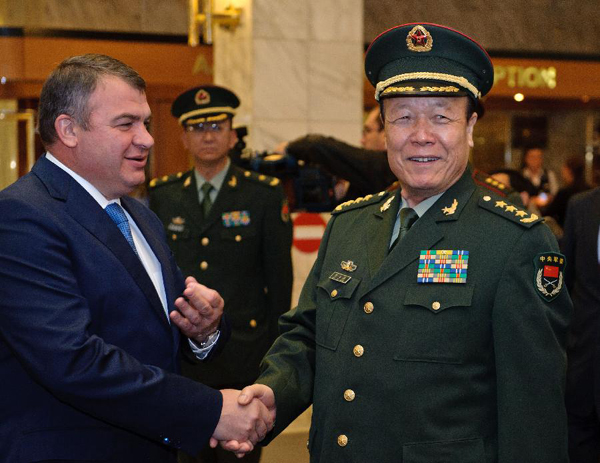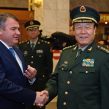
Sino-Russian Relations: Renewal or Decay of a Strategic Partnership?
Publication: China Brief Volume: 11 Issue: 18
By:

Sino-Russian relations appear to be picking up the tempo with frequent high-level visits taking place in recent months. Last week, the top Chinese military officer, Vice Chairman of the Central Military Commission, Gen. Guo Boxiong, met with Russian Prime Minister Vladimir Putin and top Russian military brass in Moscow. Both leaders emphasized that the bilateral military ties remain a key component of the Sino-Russian relationship (PLA Daily, September 23). These official activities and exchanges are part of the celebration marking the 10th anniversary of the signing of Treaty of Good-Neighborly Relations, Friendship and Cooperation between China and Russia. Chinese President Hu Jintao traveled to Moscow in mid-June for a three-day visit to celebrate the special relationship. The joint declaration signed by Presidents Hu and Dmitri Medvedev recalls the significant progress made over the past decade and charts a new course for the next ten years with a focus on expanding economic and military ties. Beijing and Moscow have also decided to elevate the bilateral relationship from the “strategic partnership” to a “comprehensive strategic and cooperative partnership” (Ministry of Foreign Affairs, June 17).
At least at the official level, the Sino-Russian relationship continues to display all the trappings of an amicable partnership characterized by regular summit meetings, high-level visits, military exchanges, and frequent consultation in bilateral and multilateral settings such as the BRICS meetings, G-20 and the Shanghai Cooperation Organization (SCO)—the last also marking its first decade of establishment. As long as both China and Russia continue to view U.S. dominance as detrimental to their aspiration for great-power status and their core national interests, observers can expect the imperative for cooperation will remain despite recent troubles in the relationship.
Partnership Blues
Since China and Russia established a strategic partnership in 1996, bilateral relations have experienced periods of rapid development, heightened expectations, disappointments, and renewal. From Beijing’s perspectives, a stable Sino-Russian relationship is beneficial to both countries and remains one of its foreign policy priorities.
Chinese analysts readily acknowledge the importance of Sino-Russian relations and largely in positive terms, but they also point to different interests and priorities between the two, recognize the lackluster performance in bilateral trade and investment, and express deep frustration with unfulfilled promises and a lack of progress in energy cooperation [1].
Beijing and Moscow have coordinated their policy positions and adopted mutually supportive approaches on a range of international issues from non-weaponization of space to respect for state sovereignty. What has often been characterized as a strategic partnership however has at times experienced strain and setback. Beijing was clearly taken aback when the Putin administration in 2000-2004 sought to forge closer ties with Washington and retracted on its opposition to U.S. withdrawal from the Anti-Ballistic Missile Treaty (ABM), even though China and Russia just had pledged solemnly their joint opposition to such a move [2].
Russia’s military operations against Georgia in 2008 put China in an awkward position. Beijing kept silent on the event but was not pleased with Moscow’s subsequent recognition of the two breakaway republics Abkhazia and South Ossetia, given China’s own concerns with separatist activities in Xinjiang and the Taiwan issue. While SCO provides a platform for China and Russia to cooperate on anti-terrorism, energy security and regional stability in Central Asia, the two countries differ on membership expansion, priorities for the organization and implicitly compete for leadership [3].
Military ties and defense cooperation always have been an important pillar in the strategic partnership between the two countries. Indeed, China certainly has benefited tremendously from procurement of advanced Russian weapons systems and military technology transfers. Top military leaders hold regular talks; joint military exercises such as Peace Mission and port calls help enhance mutual understanding of the two armed forces.
In recent years, however, Chinese interests have shifted from purchases of off-the-shelf weapons systems to acquisition of military technologies, joint development and license production. Bilateral arms trade volumes subsequently have declined. Russia has been cautious in expanding bilateral military cooperation beyond arms sales for fear of future competition from Chinese defense industry in the international market. The more important reason however may be Russia’s concern over the rise of China. Indeed, Chinese analysts have pointed to Russia’s growing military deployment in the Far East in recent years, including tactical nuclear weapons, in preparation for future unspecified contingencies [4]. Meanwhile, Russia has been willing to sell advanced weapons systems to India and Vietnam, and is pushing for increased arms sales to some Southeast Asian countries (Global Times, August 31).
For two large continental countries sharing a strategic partnership, bilateral economic ties have remained underdeveloped. Sino-Russian trade, at around $55.4 billion in 2010, trails behind most of China’s other key trading partners. Bilateral investments are appallingly low with accumulated Chinese direct investment in Russia at $2 billion by 2009. Chinese businessmen complain about the Russian investment environment and wide-spread corruption among officials as major impediments, while Moscow charges China with dumping low-quality consumer goods and other illicit trading practices. It is clear that Russia is unwilling to become a supplier of raw materials and energy to China while Chinese products swamp its market (China Daily, April 13; Richard Weitz, “China-Russia Relations and the United States: At a Turning Point?” Second Line of Defense, April 12, 2011).
This may explain the slow pace of and Chinese frustration with energy cooperation over the past decade. Different expectations, disputes over costs and pricing and Russia’s opportunistic pursuit of its energy leverage have led to repeated delays and unfulfilled promises. On the one hand, Moscow is averse to becoming an energy appendage to China; on the other hand, rising price in oil provides Russia with huge revenues and enhances its bargaining power vis-à-vis energy importing countries, including China. The drawn-out negotiation over and the constant changes in the construction of the Angarsk-Daqing pipeline have both raised the costs and lowered the confidence in Sino-Russian energy cooperation. Chinese oil companies have faced barriers in investing in Russia’s energy sector and Moscow has not reacted positively to Chinese energy cooperation with Central Asian countries such as Turkmenistan and Kazakhstan. Bilateral talks on Russian supply of natural gas to China have been dragging for over a decade without closing the deal. Chinese media suggests Gazprom seeks $40 billion in advance prepayment for Russian guarantee of a 30-year supply of natural gas to China (Global Times, August 19) [5].
Strategic Partnership in the Next Decade
Marking two important anniversaries in 2011, Chinese and Russian leaders recognize the value of their strategic partnership even though their respective interests and priorities sometimes take precedence over their taunted friendship. Overall, however, the relationship however remains positive and the institutional foundation developed over the years will provide Beijing and Moscow the necessary compass and sufficient incentives to strengthen cooperation on a number of fronts.
China will continue to value a stable Sino-Russian relationship and promote closer partnership where both countries will benefit. On the strategic front, maintaining the over 4,000-kilometer border peacefulyl and keeping a friendly neighbor has been one of the key diplomatic achievements Beijing has accomplished since the end of the Cold War. At the same time, working closely with Russia through the Shanghai Cooperation Organization allows China access to energy resources in Central Asia and to secure SCO member states’ support and collaboration in combating ethnic separatism in its remote northwestern region.
Beijing has been attentive to developments in Russian-U.S. relations, especially in the wake of their “reset” and the conclusion of the New START Treaty on nuclear arms reduction as well as how these would affect China’s interests and the Sino-Russian strategic partnership. The Medvedev government is seeking to develop a closer relationship with the Obama administration and this policy orientation has already affected how Beijing and Moscow coordinate their approaches to issues ranging from Iran to Libya [6].
Managing Sino-Russian relations requires vision and forward-looking perspectives. Beijing recognizes Moscow’s nostalgia for its glorious past and its aspiration for playing an important role in both regional and global affairs, and has accorded due respect to its northern neighbor. Understandably, China’s phenomenal rise and demographic changes in the two countries also stoke Russian paranoia about an impending Chinese take-over of the Far East. Addressing these concerns requires not only closer dialogues between officials but also greater contacts and better understanding between the two peoples.
China and Russia both recognize they need to do more to facilitate bilateral trade and encourage investment. Beijing and Moscow have set targets for achieving $100 billion and $200 billion in annual trade before 2015 and 2020, respectively. During his recent visit to Russia, Wu Bangguo, head of the Chinese National People’s Congress, put forth four proposals for deepening bilateral economic ties, including cooperation on energy, science and technology exchanges, and border region trade (People’s Daily, September 15).
With the Skovorodino-Daqing pipeline finally opened for operation on New Year’s Day 2011, Sino-Russian energy cooperation entered a new era. Russia would export 15 million tons of crude oil annually to China for 20 years (Wall Street Journal, September 27, 2010). China’s growing demands for energy, its strategy to diversify energy imports from the Middle East and Africa as well as its ongoing cooperation with Central Asian states could provide incentives for Russia to expand and speed up energy cooperation with China.
Looking Forward
The celebration of a decade of the Sino-Russian Friendship Treaty and the elevation of the "strategic partnership" to a "comprehensive strategic cooperation and partnership" turn a new page in the relationship between the two countries. The key words here are "comprehensive" and "cooperation," which suggest the need to anchor the bilateral relationship in a broader and more substantive footing. There are strategic imperatives for strengthened coordination and cooperation between China and Russia in defending their national interests, including stability, sovereignty and external security. Beijing looks set and confident in moving the relationship to the next level.
Despite the rhetoric and frequent bilateral high-level exchanges in recent months, challenges remain for Beijing and Moscow. One is the leadership transition in China in 2012-2013 that will see new generations of civilian and military leaders taking up new positions. While Russian leaders will remain mostly the same, with the only change being the swap between Putin and Medvedev, it will take some time for the leaders of the two countries to get acquainted. Secondly, past disappointments in realizing ambitious targets in bilateral trade targets and promises in energy cooperation suggest promoting bilateral economic ties may be easier said than done. Observers reasonably can expect impediments ahead, largely as a result of the two countries’ divergent expectations, capacities and priorities within a changing global economic environment. Finally, coordinating and aligning their policies at the strategic level probably will prove increasingly difficult as a more nationalist Putin returns to office and as Chinese and Russian interests drift in different directions. The drift probably will continue unless and until both feel greater threats from the United States—the only salient rationale for this largely superficial partnership that has so far appeared more convenient than strategic.
Notes:
- Zhao Mingwen, “Zhong’e guanxi de fazhan ji zhanwang [Developments and Prospects of Sino-Russian Relations],” Heping yu fazhan [Peace and Development], No. 2, 2011.
- Chen Xianliang and Zhang Mei, “E duihua zhengce de bianhua ji zhongguo celue yingdui [Changes in Russian China Policy and China’s Response],” Dongbeiya luntan [Northeast Asian Forum], no. 2 (2009).
- Zhao Huasheng, “Zhong’er guanxi zhongde shanghai hezuo zuzhi (SCO in Sino-Russian Relations),” Heping yu fazhan [Peace and Development], No. 1 (2010).
- Zhao, “Developments and Prospects of Sino-Russian Relations.”
- Wang Haiyun, “Zhong’e nengyuan hezuo de youli yinsu yu zhiyue yinsu (Facilitating and Constraining Factors in Sino-Russian Energy Cooperation),” E’luosi xuekan [Russian Studies], No. 3, 2011.
- Yu Bin, “China-Russia Relations: Politics of Two Anniversaries,” Comparative Connections, September 2011.





